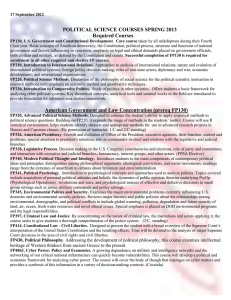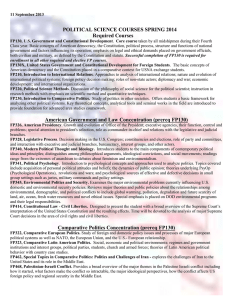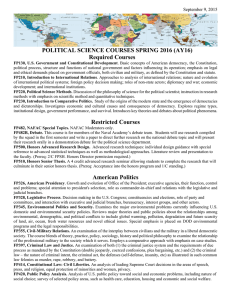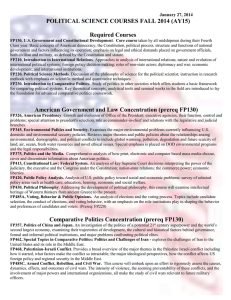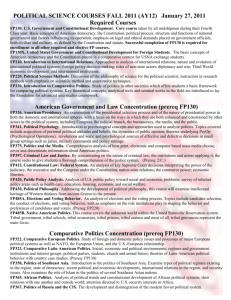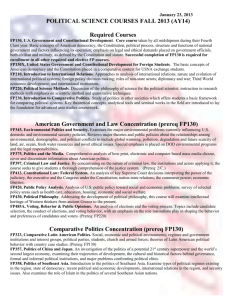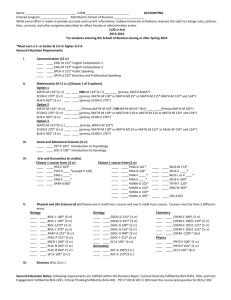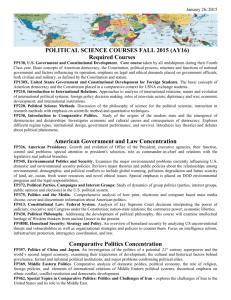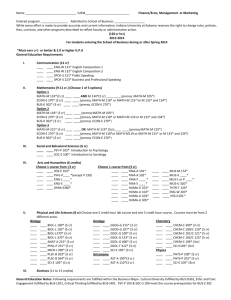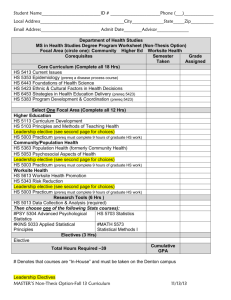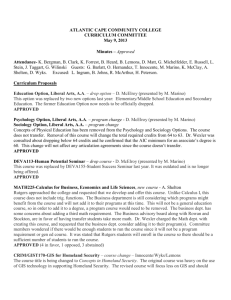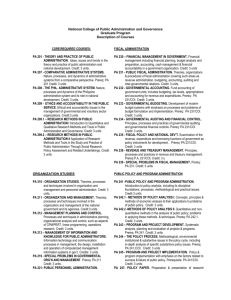Spring 2015 (AY2015) Courses
advertisement
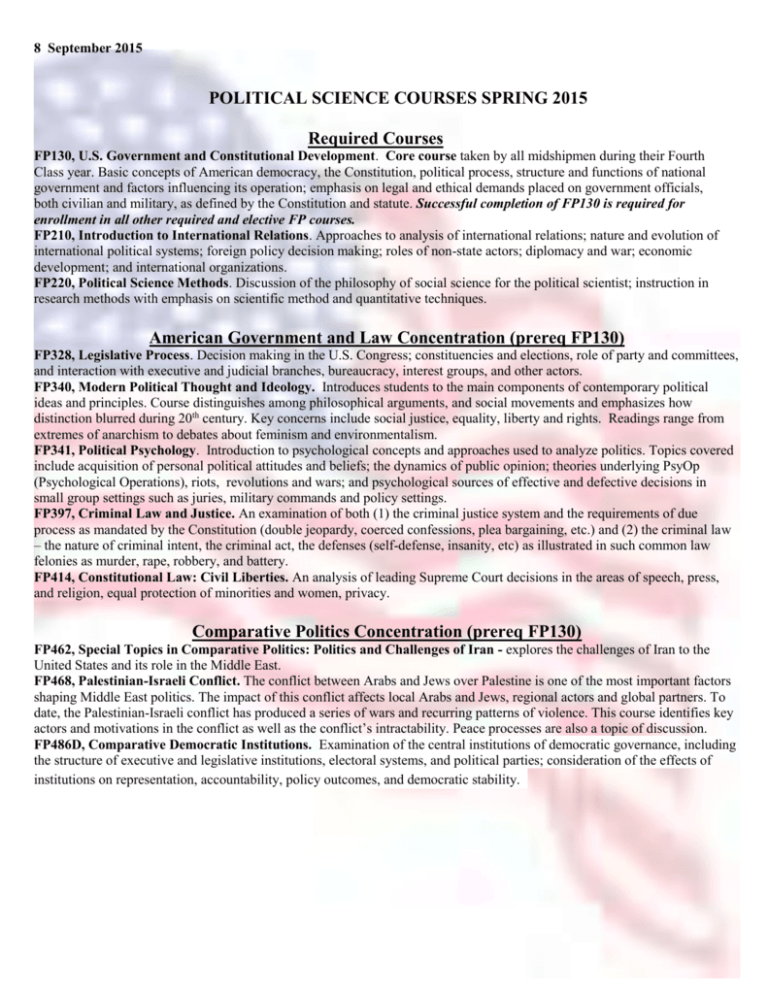
8 September 2015 POLITICAL SCIENCE COURSES SPRING 2015 Required Courses FP130, U.S. Government and Constitutional Development. Core course taken by all midshipmen during their Fourth Class year. Basic concepts of American democracy, the Constitution, political process, structure and functions of national government and factors influencing its operation; emphasis on legal and ethical demands placed on government officials, both civilian and military, as defined by the Constitution and statute. Successful completion of FP130 is required for enrollment in all other required and elective FP courses. FP210, Introduction to International Relations. Approaches to analysis of international relations; nature and evolution of international political systems; foreign policy decision making; roles of non-state actors; diplomacy and war; economic development; and international organizations. FP220, Political Science Methods. Discussion of the philosophy of social science for the political scientist; instruction in research methods with emphasis on scientific method and quantitative techniques. American Government and Law Concentration (prereq FP130) FP328, Legislative Process. Decision making in the U.S. Congress; constituencies and elections, role of party and committees, and interaction with executive and judicial branches, bureaucracy, interest groups, and other actors. FP340, Modern Political Thought and Ideology. Introduces students to the main components of contemporary political ideas and principles. Course distinguishes among philosophical arguments, and social movements and emphasizes how distinction blurred during 20th century. Key concerns include social justice, equality, liberty and rights. Readings range from extremes of anarchism to debates about feminism and environmentalism. FP341, Political Psychology. Introduction to psychological concepts and approaches used to analyze politics. Topics covered include acquisition of personal political attitudes and beliefs; the dynamics of public opinion; theories underlying PsyOp (Psychological Operations), riots, revolutions and wars; and psychological sources of effective and defective decisions in small group settings such as juries, military commands and policy settings. FP397, Criminal Law and Justice. An examination of both (1) the criminal justice system and the requirements of due process as mandated by the Constitution (double jeopardy, coerced confessions, plea bargaining, etc.) and (2) the criminal law – the nature of criminal intent, the criminal act, the defenses (self-defense, insanity, etc) as illustrated in such common law felonies as murder, rape, robbery, and battery. FP414, Constitutional Law: Civil Liberties. An analysis of leading Supreme Court decisions in the areas of speech, press, and religion, equal protection of minorities and women, privacy. Comparative Politics Concentration (prereq FP130) FP462, Special Topics in Comparative Politics: Politics and Challenges of Iran - explores the challenges of Iran to the United States and its role in the Middle East. FP468, Palestinian-Israeli Conflict. The conflict between Arabs and Jews over Palestine is one of the most important factors shaping Middle East politics. The impact of this conflict affects local Arabs and Jews, regional actors and global partners. To date, the Palestinian-Israeli conflict has produced a series of wars and recurring patterns of violence. This course identifies key actors and motivations in the conflict as well as the conflict’s intractability. Peace processes are also a topic of discussion. FP486D, Comparative Democratic Institutions. Examination of the central institutions of democratic governance, including the structure of executive and legislative institutions, electoral systems, and political parties; consideration of the effects of institutions on representation, accountability, policy outcomes, and democratic stability. International Relations Concentration (prereq FP130) FP314, Formulation of U.S. Foreign Policy. Case study-based review of the content, formulation and execution of U.S. foreign policies since World War II, including decision-making processes, administration of policy and development of current policies. FP371, Asian International Politics. Analysis of interstate relations of selected East and Southeast Asian states; concentration on regional organizations, security alliances and bilateral arrangements. FP384, Politics of Irregular Warfare. Theoretical, historical and policy examination of low-level political-military confrontation; viewed from several perspectives, such as revolutionary, policy-making, military and nation-state; focus on U.S. response to LIC. (2/C standing) FP421, National Security Policy. Examination of US National Security Policy domestic and foreign, political and military considerations in the formulation and execution of policy, use of case studies (Gulf War, Iraq conflict, Rebalance to China, the changes in US-Japan Policy, ME challenges, Russia, Ukraine and Europe. Simulation, debate, field trip if possible. (Prereq: FP130, FP210) FP437, International Organizations. International organizations in world politics; attention given to control of conflict and violence, economic cooperation and management of global resources; major focus on the United Nations; discussion of selected regional issues and other organizations. FP460 Global Issues and National Security Threats. Taught by the Class of 1960 Distinguished National Security Chair. This course will explore and deepen the midshipmen’s understanding of the development of nuclear weapons, their relationship to US National Security strategy, the effects to control them and the security challenges that controlling these weapons of unprecedented destructiveness have presented and will continue to present for US national security in the coming decade. Baseline for the discussion of today’s challenges and include focus on several case studies including North Korea, Iran, Pakistan, Black Market Technology Transfers, Nuclear Terrorism, Strategic Arms Reductions, and Nuclear Energy and Nuclear Proliferation. Restricted Courses FP482, NAFAC Special Topics. NAFAC Moderators only. FP482B, Debate. This course is designed for members of the Naval Academy’s debate team. Students will use research compiled by the squad in the first semester and write a paper to direct further research on the national debate topic and will present their research orally in a demonstration debate for the political science department. (can only take once for credit) FP500, Honors Advanced Research Design. Advanced research techniques: individual design guidance with special reference to advanced statistical techniques as well as methodological approaches. Literature review and presentation to the faculty. (Prereq: 2/C FPSH. Honors Director permission required.) FP510, Honors Senior Thesis. A 4 credit advanced research seminar allowing students to complete the research that will culminate in their senior honors thesis. (Prereq: Acceptance into the honors program and 1/C standing.)
